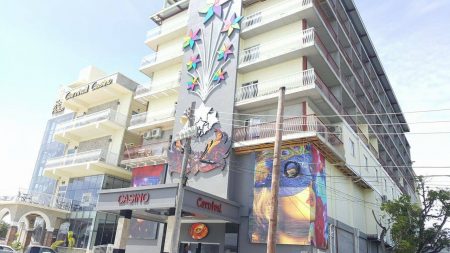In considering the fresh application made by SleepIn International Hotel and Casino Inc for a casino licence, the Gaming Authority has asked that the company and its directors submit income tax returns for a seven-year period.
Sections 29 A and 32 (1) of the Gambling Prevention Act gives the Gaming Authority the power to request such information. These amendments are contained in the Anti-Money Laundering and Countering the Financing of Terrorism (Amendment) Act, which was assented to by President David Granger on July 10, 2015.
Section 29 A states, “The Gaming Authority shall assess the integrity of an applicant, partner, shareholder, office holder of an applicant and beneficial owner on the basis of fit and proper criteria on a regular basis and whenever there is a change in ownership or management.”
Section 32 (1) also provides for the Gaming Authority to “prescribe the criteria to be considered in assessing the integrity of any person or firm who applies for a licence or a holder of a licence on a regular basis and whenever there is a change in ownership or management.”

Stabroek News was told that it was on the basis of these amendments that the Authority requested the income tax information.
Clifton Bacchus, the manager/proprietor of the hotel, received a letter late last month asking that he, the hotel as well as directors Zena Paul and Jennifer Paul-Bacchus submit their returns for the past seven years. Up to Monday, there was no indication that the requested information was provided.
An attorney, who asked not to be identified, however, said Parliament did not empower the Gaming Authority to request seven years of tax returns of a person applying for a licence. “Parliament legislated what the requirements are. That is not one of them. If Parliament wanted such a requirement, it would have included it expressly in the Act or the Regulations,” the attorney pointed out. “Significantly, it is not a requirement with which Parliament is unfamiliar because Parliament has given the GRA [Guyana Revenue Authority] such power. So, if Parliament wanted such a power to be enjoyed by the Gaming Authority, it would have given it that power. It did not,” the attorney said while stressing that not even the Financial Intelligence Unit (FIU) can make such a request.
The attorney also said that the personal financial records of a person are not to be treated lightly. “Matters such as these cannot be inferred in a statute as being required. They must be expressly required. The simple legal truth is that Parliament did not empower the Gaming Authority to do so,” the attorney said, while stressing that the Authority’s request is unlawful.
Persons close to the hotel are convinced that this is all part of the Authority’s plan to deny Bacchus a casino licence. If granted, the establishment would be the country’s second casino.
Sources close to Bacchus said that he is very frustrated as his first application was denied and he fears that his current application might face a similar fate.
Late last year, the Authority rejected Bacchus’ application after no documents on the establishment’s “financial soundness and capability” were provided as required.
It said that having received and thoroughly considered the application, it unanimously found no evidence upon which it could arrive at a determination that SleepIn International Hotel & Casino Inc. qualifies for the issuance of the licences applied for, having regard to its failure to provide the Authority with documents evidencing its financial soundness and capability, which is one of the critical criteria for the granting of such licences.
The Authority called it “a grave defect” in the applications, which necessitated a refusal, since the regulations Section 29 (a) (1) (c) of the Gambling Prevention Act speak clearly and specifically to “the financial soundness and financial capability of the applicant.”
Earlier this year, Bacchus reapplied.





